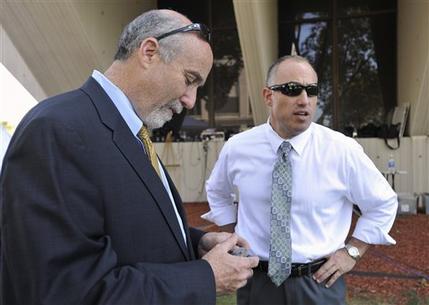CHICAGO (AP) — Drew Peterson’s defense lawyers were a united, wisecracking front during most of the former suburban Chicago police officer’s 2012 trial, and rarely without their dark sunglasses. But by the time Peterson was found guilty of killing his third wife, the counsel’s bond was irreparably fractured.

The public verbal sparring between former lead trial counsel Joel Brodsky and colleague-turned-nemesis Steve Greenberg will come to a head Tuesday at a hearing in Will County. The defense plans to argue that Peterson deserves a new trial because Brodsky botched the first.
If Will County Judge Edward Burmila rejects the motion for a retrial, he has said he will move on to the sentencing phase. Peterson, 59, faces a maximum 60-year prison term for murdering Kathleen Savio, who was found dead in her bathtub with a gash on her head.
The legal team’s infighting is the latest twist in the peculiar saga of the former Bolingbrook police sergeant, who gained notoriety after his much younger fourth wife, Stacy Peterson, vanished in 2007.
Disagreements among the counsel during trial are not uncommon, said Chicago-area defense attorney Gal Pissetzky, but such spats spilling into public view are.
“A new team of lawyers might accuse an old team of lawyers of making mistakes at the trial – but lawyers on the same trial team blaming each other? I’ve never heard of anything like this,” he said. Pissetzky is not connected to the Peterson case.
The feud escalated earlier this month when Brodsky filed a defamation lawsuit against Greenberg, which claims Greenberg became “irrationally fixated and obsessed with destroying Brodsky” and held Brodsky up to “great public scorn, hatred, contempt (and) ridicule.”
In an open letter to Brodsky in September, Greenberg accused him of “single-handedly” losing the trial, adding he “wafted the greatest case by ignorance, obduracy and ineptitude.”
The current acrimony is in stark contrast with the beginning of the trial, when the limelight-seeking defense team faced the media horde together. Several times, they insisted that Stacy Peterson – whose body was never found – could show up any day to take the stand.
If Brodsky takes the stand Tuesday, he could face aggressive cross-examination by Greenberg and his other erstwhile colleagues. There’s even an outside chance Peterson could be asked testify.
Among the accusations against Brodsky, chief is that he was so bent on publicizing himself that he pressed Peterson into a damaging pretrial media blitz.
But the hearing’s focus is expected to be a decision that backfired during trial – calling divorce lawyer Harry Smith to be a witness for the defense. Greenberg says that was Brodsky’s decision; Brodsky says all the defense lawyers agreed on it.
Under questioning by Brodsky, Smith told jurors that Stacy Peterson had asked him a question before she vanished: Could she squeeze more money out of her husband in divorce proceedings if she threatened to tell police that he murdered Savio three years earlier?
Brodsky hoped Smith’s testimony that Stacy Peterson allegedly sought to extort her husband would dent the credibility of statements she made to others that Drew Peterson threatened to kill her.
Savio’s death was initially deemed an accident, a freak slip in the tub. But after Stacy Peterson vanished, Savio’s body was re-examined and her death was reclassified as a homicide.
During Smith’s testimony, he repeatedly stressed how Stacy Peterson seemed to sincerely believe her husband had killed Savio. Prosecutors could barely contain their joy, with chief state’s prosecutor James Glasgow calling it “a gift from God.” And some jurors said later that Smith’s testimony persuaded them to convict Drew Peterson.
Judges rarely grant retrials, even in egregious cases of missteps. And when they do, it is usually because an attorney didn’t make a certain argument or call a witness who might have exonerated a defendant, explained Kathleen Zellner, another Chicago-area defense attorney.
“It’s usually not for something an attorney did but for what they did not do,” she said.
But seemingly nothing can be ruled out in this case, which has been full of oddities since first making headlines in 2007. Peterson’s trial was the first in Illinois history where prosecutors built their case on hearsay, thanks to a new law tailored specifically for the case, dubbed “Drew’s Law.”
Still, most legal observers agreed that the motion for a new trial is a longshot, at best.
“Nothing in this case has been usual,” Pissetzky said. “But the chances for this motion to succeed are slim to none – and slim just left the building.”





